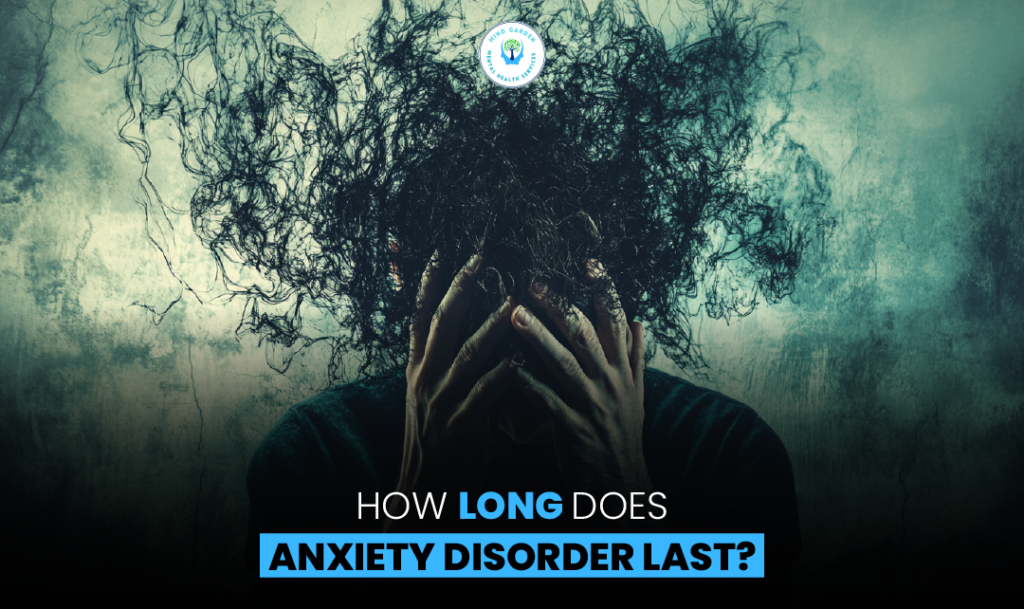
Occasionally, we all experience the overwhelming emotion of anxiety. Our body’s stress response is a “fight or flight” mode. This primal reaction, though intense, is a natural part of being human.
It may seem odd, but anxiety can sometimes help. It can alert you to a life-threatening situation, prompting quick action to avoid it.
However, the anxiety usually disappears once that threat or stressful moment passes. For some, anxiety can become so extreme that it is debilitating. It outlives its short-term helpfulness.
If your anxiety is persistent or arises without reason, you may wonder, how long does anxiety disorder last?
Do you have an anxiety disorder? Begin your path to a better life. Contact Mind Garden Mental Health Services now.
When Does Anxiety Become an Anxiety- Disorder?
Anxiety disorder is a medical term. It means that worry impairs your daily functioning. The worry is also out of proportion to the situation. You must experience it most days for at least six months.
Anxiety disorders cause constant, excessive fear and worry in daily life. People with these disorders try to avoid situations that trigger their fear.
Chronic anxiety isn’t like occasional anxiousness. It doesn’t come and go on its own. The stress response is always activated.
There are several types of anxiety disorders. These include:
- Generalized anxiety disorder: Constant, excessive worry that disrupts daily life.
- Panic disorder: Unannounced, terror erupts. A storm of distress overwhelms its victims. The sudden dread forever mar.
- Social anxiety disorder: You feel intense fear in crowds. You think everyone is judging you. Talking to people becomes risky. You’re scared of making mistakes or saying the wrong thing. The fear of rejection is huge. So, you see social events as burdens, not chances. This crippling anxiety comes from worrying too much about what others think.
- Phobias: Irrational fear takes over, ignoring reason. Simple triggers spark panic. Terror overwhelms, silencing logic. People feel trapped in intense anxiety. For them, normal scenes become nightmares. These strong fears defy rational thought, tightly gripping individuals.
- Separation anxiety disorder: It causes a fear of being away from loved ones. This fear includes worries about losing them and concerns for their safety.
How Long Does Anxiety Disorder Last?
Anxiety disorders don’t follow set timelines. Their length varies widely. It’s due to personal situations and strengths. There’s no one-size-fits-all schedule. However, certain factors can impact these disorders. These elements help explain anxiety’s unpredictable hold on life.
- Being older
- Unemployed
- Living alone
- Having a physical disorder or poor function
- Speed of diagnosis and treatment
- Social anxiety disorder lasts longer and responds slower to treatment.
- Having multiple anxiety disorders
What Does Research Indicate?
Without intervention, anxiety disorders can worsen and disrupt your life.
According to the WHO, Anxiety can lead to depression, addiction, and thoughts of suicide. Some people struggle with it for decades, while others find relief.
Research shows a mix of hope and risk. Recovery is possible, but relapses can happen. Generalized anxiety disorder often lasts 20 years, with cycles of improvement and setbacks. Yet, hope remains, even if the journey is different for everyone.
How is Anxiety Treated?
Treatment for anxiety primarily involves therapy and medication, either separately or together. Clinicians should also tackle conditions like depression or addiction for effective care. The best approaches are those that consider all related issues.
Here are common treatments:
Talk Therapy
- Psychotherapy: One-on-one sessions with a therapist.
Types of therapy include:
- Cognitive Behavioral Therapy (CBT): Helps change negative thought patterns.
- Dialectical Behavior Therapy (DBT): Focuses on coping skills to manage anxiety.
Use CBT to face fears and DBT to manage emotions. Both therapies help conquer anxiety. Each offers a different route to calm. Over time, they lead to a less anxious life.
Medications
When therapy alone isn’t enough, doctors may prescribe:
- Benzodiazepines: Fast-acting for immediate relief, but have addiction risks.
- SSRIs/SNRIs: Commonly used for long-term anxiety management.
Combining therapy with specific medications often brings the best results. Finding the right drug takes time. Always follow your doctor’s advice.
Signs You are Recovering from Anxiety
A person healing from anxiety and panic attacks may experience anxiety recovery stages:
- Fewer, less intense attacks
- Better sleep: quality and duration
- Improved coping skills for stress and anxiety
- More interest in socializing and relationships
- A gradual return to avoided activities
- A greater sense of control over thoughts and emotions
- A better mood and outlook on life
In Conclusion
How long does anxiety disorder last?
Anxiety disorders can last for different lengths of time. It depends on personal factors and treatment. With proper therapy and medication, many people experience significant improvement. Recovery is possible. Recognizing progress can inspire hope for a less anxious future.
FAQs
How is anxiety treated?
Anxiety relief can come from therapy, medication, or both. Cognitive Behavioral Therapy is one option. SSRIs and benzodiazepines are medication choices. Each method tackles anxiety in its own way.
Can anxiety go away on its own?
Short anxieties go quickly. However, ongoing anxiety requires expert help for lasting peace.
How long does anxiety take to go away?
Healing times vary greatly. Some recover in weeks, while others need much longer. Each person’s process is unique, depending on the severity of their condition.
